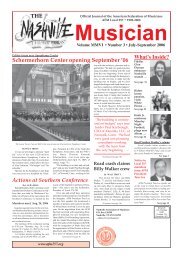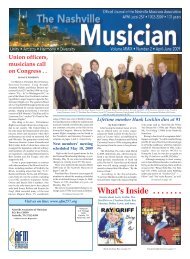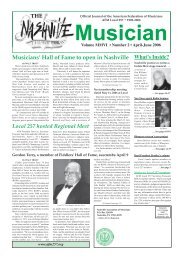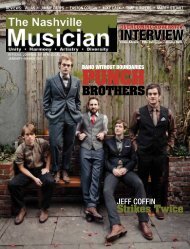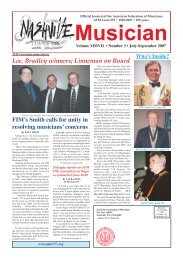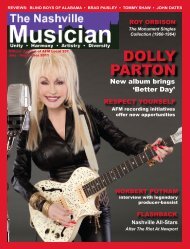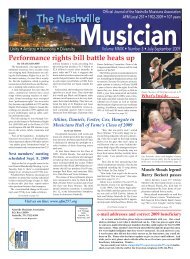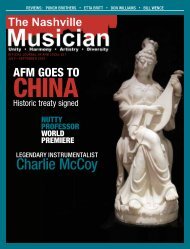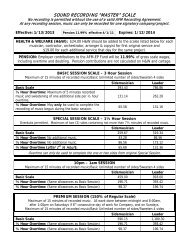Musicians Web pages - Nashville Musicians Association
Musicians Web pages - Nashville Musicians Association
Musicians Web pages - Nashville Musicians Association
Create successful ePaper yourself
Turn your PDF publications into a flip-book with our unique Google optimized e-Paper software.
30 The <strong>Nashville</strong> Musician April-June 2007<br />
Fellow Local 257 multi-instrumentalist Greg Cole co-produces<br />
Daryle Singletary’s latest album comes ‘Straight From the Heart’<br />
By WALT TROTT<br />
Daryle Singletary is the real deal, a rootsoriented<br />
singer, who thrives on twang. Inspired<br />
by the likes of Jones and Haggard, he<br />
nurtured a love of country playing in honkytonks,<br />
and in appreciation has released yet a<br />
second album saluting golden oldies: “Straight<br />
From the Heart.”<br />
He’s known best for his original 1996 hits<br />
“Too Much Fun” and “Amen Kind of Love,”<br />
Singletary’s deep vocals lend themselves well<br />
to such classic cuts as Don Williams’ “Some<br />
Broken Hearts Never Mend,” Buck Owens’<br />
“A Tiger By the Tail” and Conway Twitty’s<br />
“Fifteen Years Ago.”<br />
These are among the dozen tunes heard<br />
on Daryle’s new CD, co-produced by longtime<br />
associate Greg Cole and Chuck Rhodes<br />
for the indie Shanachie label, distributed by<br />
Koch Entertainment.<br />
Singletary and Cole stopped by the musicians’<br />
union for an interview about their latest<br />
album project, a chat taped in the parking<br />
lot on one of March’s first sunny days here.<br />
“I’m passionate about what I do,” says<br />
Singletary, who just marked his 36th birthday.<br />
“I’m not just going out making a living<br />
or just to get a check. I’m doing what I like -<br />
and I’m having fun. Since 1995, I’ve consistently<br />
played an average 60-to-80 dates a year.<br />
If you ask me, that says a lot about the state of<br />
our industry. I’ve been very fortunate and I’m<br />
thankful. I’ve seen some of my friends come<br />
into this business, have a hit and now they’re<br />
not out there anymore. I’m still here and I ain’t<br />
goin’ anywhere.”<br />
Dark-haired Daryle is a burly, no-nonsense<br />
guy, who doesn’t gloss over the facts:<br />
“I mean here I sit (on the tailgate of Cole’s<br />
pickup truck) in a pair of faded-out pants and<br />
boots, and I’ve got paint all over my shirt . . .<br />
“Our new album came out Feb. 27 and I<br />
think we sold a little over 1,100 pieces the<br />
first week, with 800 of those sold at Wal-Mart.<br />
Koch is our distributor, and Michael Koch<br />
owns it. It’s the largest independent distributor<br />
in the U.S. So they’re big and even sell in<br />
Wal-Mart. Hey, those ain’t the numbers a Tim<br />
McGraw sells, but we didn’t make the record<br />
for $250,000 either. We made it for under $50<br />
grand and here we are making money, while<br />
others are trying their darnedest to sell records,<br />
having to buy promotions here and promote<br />
there, spending more money.<br />
“We’re going about it saying, ‘Let’s go<br />
out there and work our behinds off and plug<br />
this record where we can make it work.’ I think<br />
the positive thing about it is if everybody<br />
keeps their minds on doing what’s real, and<br />
knows that we’re not trying to play with the<br />
big boys, because we can’t. What we’re doing<br />
is from the heart (we teasingly interrupt<br />
to remind him the title’s ‘Straight From the<br />
Heart’ and he chuckles), I mean straight from<br />
the heart, exactly.<br />
“We’re taking what we have to work with<br />
and we’ve got music that we’re proud of. Well,<br />
we can go home at night and go to sleep, saying<br />
‘We’ve done our best,’ and in the long run<br />
people know it’s out there and they’ll go out<br />
and get it. That’s where we’ve been fortunate.<br />
“Even though the deal’s been done, we<br />
sold 70,000 records of ‘That’s Why I Sing This<br />
Way.’ And that’s not bad money. Personally, I<br />
feel lucky to still be in this business, doing<br />
what I believe in. Greg and I started working<br />
together when we were (practicing) in a basement<br />
in Antioch (a <strong>Nashville</strong> neighborhood).<br />
He was playing for Jack Greene and I was<br />
still singing in a club, an unknown and he<br />
played for me on weekends or weekdays,<br />
when he wasn’t out with Jack(’s Jolly Greene<br />
Giants band).”<br />
Cole also produced Singletary’s acclaimed<br />
Audium album “That’s Why I Sing<br />
This Way,” in 2002, their first tribute to traditional<br />
favorites, which also boasted the thennew<br />
Billboard Top 40 title track, written by<br />
Max D. Barnes.<br />
No doubt that much-played tune would<br />
have been an easy Top 10 for Daryle had it<br />
Daryle Singletary and his co-producer Greg Cole in the Union parking lot as taken by Kathy Shepard.<br />
been released by a major label, with its knowing<br />
lyric, “Mama used to beat me with a<br />
George Jones album/That’s why I sing this way<br />
. . .”<br />
“I think Audium just didn’t understand the<br />
way things worked,” notes Greg. “I mean Koch<br />
(Entertainment, the label’s parent company)<br />
mostly did adult contemporary out of New<br />
York City. It needed a different promotional<br />
angle on it, and it would have been (ranked)<br />
way up there.”<br />
Daryle adds, “Even with the modest success<br />
we did get out of that song, it was very<br />
much talked about. I guess that’s one of the<br />
neat things about it.”<br />
So with the success of their “That’s Why I<br />
Sing This Way” tribute to traditional, why the<br />
need now for a second such release?<br />
“Well the Shanachie (named after an Irish<br />
storyteller) folk had heard our other album, and<br />
they wanted us to do another,” grins Daryle.<br />
“And I didn’t have any problem with that, being<br />
such a big fan of jack country music and<br />
some of these songs that we did on the record.<br />
Anyway, Shanachie’s sort of known for doing<br />
remakes, and they know we had some success<br />
with that first one.<br />
“You know the thing about it is if they’re<br />
ever fortunate enough to get to mainstream<br />
radio, the songs may do well, because there’s<br />
a lot of listeners today who might think they’re<br />
new, not having heard those cuts by the original<br />
artists. So they may not know those songs.”<br />
Did Greg and Daryle have to be careful<br />
about copying the arrangements or watch his<br />
vocal style in covering classics cut by such<br />
icons as George Jones or John Anderson?<br />
“It never scared me to do those songs, taking<br />
the attitude we’re not trying to re-do perfection,<br />
because they’d already been perfected<br />
by the original artists . . . ”<br />
The slender producer answers: “We just<br />
kinda put our spin on ’em, maybe modernizing<br />
them for today’s format . . .”<br />
There are some more recent gems, as well,<br />
among them Keith Whitley’s “Miami, My<br />
Amy” and Randy Travis’ “Promises.”<br />
Daryle, chuckling aloud, says, “I didn’t<br />
have to watch it, because I copied their style! I<br />
cut my teeth trying to sing like Jones and Haggard.<br />
So when I moved to <strong>Nashville</strong>, I saw no<br />
reason not to try to sing like these heroes, because<br />
they’re so good. It’s inevitable that<br />
Randy (Travis) and Keith (Whitley) stole licks<br />
from Jones or Haggard. Hell, I stole licks from<br />
Randy and Keith.<br />
“You know when (Johnny) Paycheck was<br />
still Donnie Young on George Jones’ records,<br />
singing harmony and playing guitar, I’m sure<br />
Jones borrowed some of Paycheck’s style. It’s<br />
something that happens all the time. I don’t<br />
even think about it, but I personally feel that<br />
by combining all those licks I learned, I developed<br />
my own style. I’m very thankful for<br />
that. I got a call a couple weeks ago from a<br />
friend of mine, who was in Memphis. He said,<br />
‘I heard your song on the radio, and the first<br />
few words I knew it was you.’ I take that as a<br />
compliment.”<br />
How does he feel about brand new artists<br />
citing him as a musical influence?<br />
“I feel very honored to be mentioned by<br />
some of the new artists as an inspiration, and<br />
I’m like ‘Wow!’ But the recording scene has<br />
definitely changed today . . .”<br />
Greg adds, “You know we all played those<br />
oldies of Jones and Haggard in the clubs for<br />
30 years. So what liberties we took we probably<br />
planned that way, but we tried to be true<br />
to them as we have a lot of respect for those<br />
artists and the songs. I’d hate to change a Mel<br />
Street song.'”<br />
“One thing that we did do and it was cool,<br />
we had musicians playing on this record that<br />
played on the originals or in the artists’ live<br />
shows,” explains Singletary. “It was great to<br />
see a guy like Pig Robbins, who played (keyboards)<br />
on five or six of the original songs,<br />
recording with us. Mike Johnson, who performed<br />
for us on Mel Street’s ‘Lovin' On Back<br />
Streets,’ actually added a lick, saying, ‘We<br />
played this on our live show.’ Though it didn’t<br />
appear on the original recording, it didn’t take<br />
away at all from the song and kind of added a<br />
little something special that nobody would recognize<br />
but us - and it worked.”<br />
Producer Cole, when asked why he didn’t<br />
play piano or percussion on his joint production<br />
ventures with Singletary, says: “First off,<br />
I don’t like to play if I’m producing. I just have<br />
a different attitude and want to look at it from<br />
the other side of the glass. I’d rather be concentrating<br />
on that more than anything else. And<br />
I’m not all that great on the instruments (when<br />
there’s a Pig Robbins or Paul Leim available).<br />
It works out better to just wear one hat.”<br />
Daryle Bruce Singletary grew up on a<br />
farm near Whigham, Ga., and himself was<br />
initially inspired by his greatgrandmother’s<br />
fiddle playing, and by parents<br />
who performed in a gospel group (in<br />
which he started singing at age 3).<br />
By age 9, the boy had already made up<br />
his mind to be a country singer. When he was<br />
in his freshman year of high school, Daryle<br />
was playing guitar and formed his first band.<br />
“My father and grandfather were directors<br />
of our church choir, and I grew up singin’<br />
gospel, but was always a big fan of traditional<br />
country songs.”<br />
He later worked in a Ford tractor dealership<br />
and also after graduation, a print shop doing<br />
odd jobs, until owner Allen Baggett heard<br />
him sing, then urged him to try his luck in<br />
<strong>Nashville</strong>. That major move occurred on Oct.<br />
14, 1990.<br />
Singletary wasn’t the first Georgia cracker<br />
to sing a mean country ballad. He points out,<br />
“I think Georgia has flown its flag in this town<br />
pretty good. And you know Rhett Akins is from<br />
65 miles east of me in Valdosta, Doug Stone<br />
is from Marietta and Alan Jackson’s from near<br />
Atlanta. There’s a new kid now, Jake Owens,<br />
who’s from Tallahassee (Fla.), just across the<br />
state line, near where I’m from.”<br />
Once in Music City, Daryle worked on the<br />
road briefly for Tanya Tucker, then set about<br />
playing in local bars, trying to find his own<br />
way.<br />
“I thought for a while I could make a living<br />
entering talent shows,” he laughs aloud,<br />
“I won $100 (first place prize) 10 times in a<br />
row. You could do those at places like Gabe’s,<br />
The Rose Room, all those little honky tonks<br />
here back then. After I won the talent contest<br />
in one club for awhile, we started working<br />
there Sunday and Monday, and we were<br />
packin’ that place on what used to be off<br />
nights.”<br />
Cole follows up: “The first day I met him,<br />
I played on a session with him and I thought:<br />
‘This boy can sing.’ So I had invited him out<br />
to this club where I played - The Broken<br />
Spoke. I talked the manager into letting us play<br />
there on the off nights. Billy Bob Shane and<br />
Donna Faye were doing what was happening<br />
on radio, the Top 40, on Friday and Saturday<br />
nights. We were playing 1970s and early<br />
1980s’ stuff that we wanted to play, and we<br />
just had a big time. Then they added Tuesday<br />
nights . . . ”<br />
“I guess we did that for something like<br />
two years,” continues Daryle. “In fact, I was<br />
playing there when I met David Lowe, who<br />
introduced me to Rob Hendon, the guy that<br />
ran Giant music (publishing) at the time. So<br />
that’s how I demo’d ‘I Let Her Lie,’ and eventually<br />
got my record deal. Greg and I had<br />
worked together while I was doing demos,<br />
way before I got my record deal.”<br />
Although “Living Up To Her Low Expectations”<br />
was Singletary’s Top 40 Billboard<br />
chart debut, his first smash was the nearcharttopping<br />
“I Let Her Lie,” both released in<br />
1995.<br />
Run by former session drummer-producer<br />
James Stroud, Giant was also home to<br />
Texan Clay Walker, who like fellow artists<br />
Daryle, Deborah Allen, Rhonda Vincent and<br />
Neal McCoy, got caught up in that turningof-the-century<br />
closing of the label.<br />
Meanwhile, Koch Entertainment began<br />
meddling in the country field, sucking up behind-the-scenes<br />
Giant alumnus like Nick<br />
Hunter and Chuck Rhodes for the Audium<br />
imprint. In turn, these leaders called on<br />
Singletary.<br />
“I said, ‘I’d love to come over and talk to<br />
you, but I want Greg Cole to produce my<br />
records.’ Man, if you listen to my first three<br />
records on Giant, and then listen to my three<br />
or four records for Koch, well these blow them<br />
out of the water. I mean they breathe, they’re<br />
open, because here’s a guy who knows me,<br />
who’s worked with me and we don’t have to<br />
go in there and kill ourselves when we record.<br />
Greg knows when I can sing or when I can’t.<br />
“At the same time, down here (gesturing<br />
out to Music Row), when you book a studio,<br />
you’ve got to go sing. At Greg’s (Colemine<br />
Studios in suburban Smyrna), we’ve cut every<br />
vocal from George Jones to Rhonda<br />
Vincent, and all our harmonies have been done<br />
at Greg’s. They sound better than the stuff I’ve<br />
cut at some of these big-time $2,000 a day<br />
studios. The thing is, Greg knows me as a person,<br />
as a performer and that makes all the difference.<br />
I feel fortunate to have such a talented<br />
guy to record with, and it comes across on<br />
tape.”<br />
Daryle’s first Audium charting was “I<br />
Knew I Loved You” in July 2000, followed<br />
by “I’ve Thought Of Everything,” both of<br />
which were on his album “Now and Again.”<br />
(The latter tune was co-written by Texas newcomer<br />
Kerry Harvick, who for a time became<br />
Kerry Singletary, and even recorded a duet<br />
with Daryle: “Miracle In the Making.”)<br />
“Another thing with Daryle,” says Cole.<br />
“We like the same kind of music, style-wise,<br />
singing-wise . . . ”<br />
Daryle adds: “Greg knows when it’s good<br />
or it’s not, and when you’ve nailed it. He<br />
doesn’t mind saying, ‘Hey look, let’s do it<br />
another day.’ That comes after working with<br />
somebody so long. No offense to the guys who<br />
produced me before, but I may have done vocals<br />
with one guy, then this other guy comes



